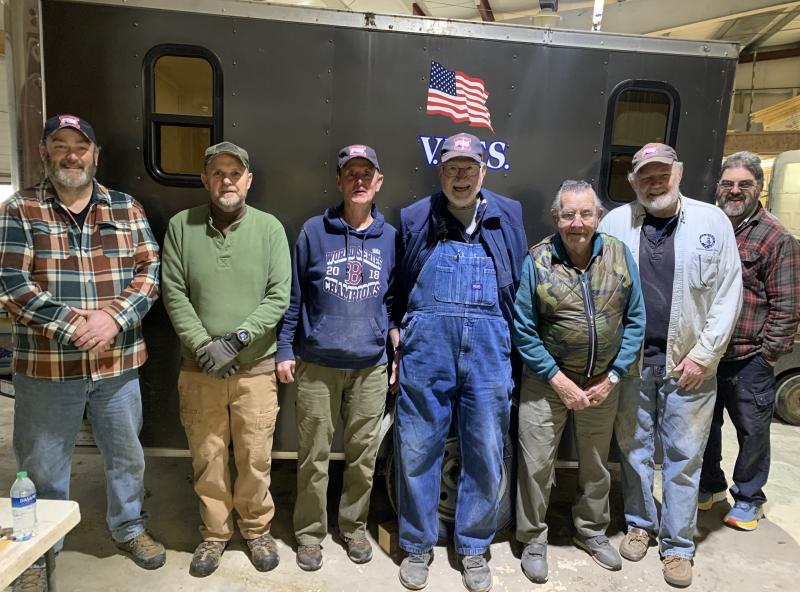Maine Dept. of Corrections lends helping hand to local V.E.T.S. program
 These V.E.T.S,. Inc. volunteers began training five Mountain View Correctional Facility (Charleston) residents Jan. 23 in building campers for homeless veterans. Pictured, V.E.T.S, Inc. volunteers, from left, Brad Drummond, John Briggs, Chris Goodwin, Ed Harmon, Arthur Richardson, John Hargreaves and Dan MacWalters. BILL PEARSON/Boothbay Register
These V.E.T.S,. Inc. volunteers began training five Mountain View Correctional Facility (Charleston) residents Jan. 23 in building campers for homeless veterans. Pictured, V.E.T.S, Inc. volunteers, from left, Brad Drummond, John Briggs, Chris Goodwin, Ed Harmon, Arthur Richardson, John Hargreaves and Dan MacWalters. BILL PEARSON/Boothbay Register These V.E.T.S,. Inc. volunteers began training five Mountain View Correctional Facility (Charleston) residents Jan. 23 in building campers for homeless veterans. Pictured, V.E.T.S, Inc. volunteers, from left, Brad Drummond, John Briggs, Chris Goodwin, Ed Harmon, Arthur Richardson, John Hargreaves and Dan MacWalters. BILL PEARSON/Boothbay Register
These V.E.T.S,. Inc. volunteers began training five Mountain View Correctional Facility (Charleston) residents Jan. 23 in building campers for homeless veterans. Pictured, V.E.T.S, Inc. volunteers, from left, Brad Drummond, John Briggs, Chris Goodwin, Ed Harmon, Arthur Richardson, John Hargreaves and Dan MacWalters. BILL PEARSON/Boothbay RegisterIn 2021, three local veterans began V.E.T.S., Inc. to assist homeless veterans finding emergency shelter. At the time, founder Ed Harmon reported there was a need for 101 temporary shelters for Maine veterans. V.E.T.S., Inc. has built 27 temporary shelters. Now, Harmon estimates the need is 288.
In effort to meet the increasing veterans’ homeless crisis, V.E.T.S., Inc. and Maine Department of Corrections are joining forces to build more campers for needy veterans. On Jan. 23, five Mountain View Corrections Center residents arrived in Boothbay to learn about transforming trailers into temporary shelters. The joint venture began after Harmon had a conversation with Maine Department of Corrections Commissioner Randall Liberty. “He’s a veteran, and he wanted to help,” Harmon said.
The cooperative venture began with several Maine prison officials visiting Harmon’s Boothbay location. Paul Moulton, the Mountain View Correction Center trade supervisor, was one of the visitors. Mountain View Correctional Facility in Charleston is a medium and minimum security/pre-release facility with a capacity of 448 adult male residents. Residents have five years or less left on their sentence. Moulton believed his program would be a good fit for providing labor in the homeless veterans’ program. “He (Liberty) asked us if we (Mountain View) could come down, and take a look at it,” Moulton said. “After coming down, we wanted to become a part of this.”
V.E.T.S., Inc. spent Jan. 23 training the five Mountain View residents in converting the empty trailers into livable temporary shelter campers. Under Mountain View’s apprentice carpenter program, residents earn time off their sentence by participating in the program. Following the training, V.E.T.S., Inc. sent two trailers to the correctional center.
Since 2021, it’s been Harmon’s volunteers who have provided the labor. The mini-mobile centers have been placed around Maine so homeless veterans will have a temporary home while waiting for more permanent housing. Harmon reports it often takes two to 14 days to process government paperwork in placing a homeless vet with a more permanent space. V.E.T.S., Inc. began building mobile units equipped with a bed, eating table, work counter, microwave oven, mini refrigerator, chair, nightstand, lights and a heater.
V.E.T.S., Inc. volunteers convert the trailer into a camper by installing windows, heating and insulation. Harmon estimates it takes two men 16 weeks to build four temporary shelters. “If you have a team of five then you can build then all that much faster,” he said.
Harmon sees the temporary shelter as second chance for veterans to get back on their feet. He sees the carpentry apprenticeship as providing the same for Mountain View residents. “Once they get out, they will need a job. This will give them a skill,” he said. “I will have no problem in contacting employers about how they put their heart and soul into this project. People need a second chance, and these workers deserve a second chance.”
Harmon didn’t want to respond to why he thought state and federal agencies didn’t do more to assist homeless veterans. Instead, he praised Liberty for his leadership. “He is doing something, and it’s an important role in this,” he said.
In recent months, V.E.T.S., Inc. began building larger campers. They started building single, and later double occupancy units. Now, some campers are built for as many as four so families can remain together. “No one knows all the reasons for homeless vets. What we know there are hundreds living on the streets. If you are sleeping on the ground when it’s 20F are you going to spend the next day looking for a warm place to sleep or a job?” he said. “The choice is pretty simple.”































